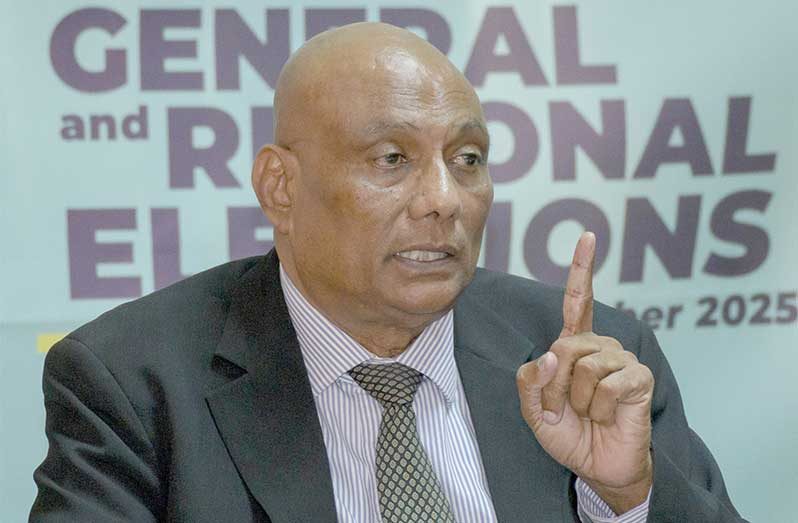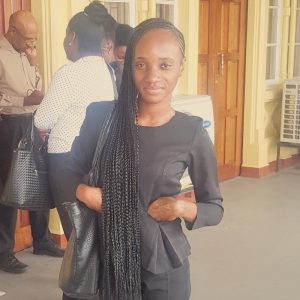–confirms ballot photos circulated Online, reiterates ban on mobile phones in polling stations
ONE week before the polls, the Guyana Elections Commission (GECOM) is reporting an 83 per cent voter turnout for the Disciplined Services, even as ballot discrepancies were detected in three districts.
Members of the Disciplined Services—comprising the Guyana Police Force (GPF), Guyana Defence Force (GDF), and Guyana Prison Service (GPS)—cast their ballots last Friday as part of early voting, ahead of Election Day scheduled for Monday, September 1, 2025.
The early voting of security personnel is intended to allow them to fulfil their electoral duties without disrupting the deployment of officers to polling stations on Elections Day.
A total of 10,481 personnel were listed to vote. The breakdown showed 2,575 of 3,106 eligible soldiers voted, along with 5,729 of the 6,909 police ranks, and 397 of the 466 prison officers.
The overall turnout is slightly higher than the 81.8 per cent recorded in 2020.
Speaking at Monday’s press briefing, Chief Elections Officer Vishnu Persaud said the August 22 balloting was carried out in full compliance with the law. He noted that while there were minor issues early on, nothing occurred that would undermine confidence in the electoral process.
But Persaud confirmed that two extra ballots were discovered in District Four’s batch, while Districts Five and Ten each came up one short. “All ballots went out, and all came back in,” the CEO clarified, dismissing any suggestion of missing votes.

He explained that the mix-up stemmed from how ballots were returned. Each was supposed to be placed in a district-marked inner envelope, but some were mistakenly sent back in the outer envelope, which cannot be used for counting because it would compromise secrecy.
“Disciplined Services ballots go out in an envelope with the name, identification number, and address of the collector. Inside that envelope is a smaller one labeled with the district in which the ballot is to be counted. The direction given to the Disciplined Services is to insert the ballot in the inner envelope, which is labeled only with the district,” Persaud explained.
After reviewing the issue, Persaud said it appears that ballots meant for Districts Five and Ten were accidentally placed with the set for District Four. According to him, a memorandum outlining the findings and recommendations will be sent to the seven-member Commission.
Persaud further confirmed that photographs of the ballots appeared Online while Disciplined Services members voted across the country last Friday.
Persaud told reporters that while the photographs are of actual ballots, GECOM has not been able to determine how, where, or when they were taken. He emphasised that the images do not compromise the integrity of the voting process.
The CEO said, “At the level of the Secretariat, we have operated at the highest and most optimal level to ensure compliance with statutory requirements, the policy decisions of the Commission, and internal best practices, in line with the expectations of stakeholders.”
When asked about additional measures to prevent the use of mobile phones in polling stations, Persaud said GECOM has already restricted their use. The move, he emphasised, is intended to curb vote buying, and stop voters from photographing their ballots.
On the issue of vote buying, he explained: “It is considered illegal, and one can be prosecuted, imprisoned if found guilty, and fined $65,000,” Persaud explained. He said the restriction was tested during the Disciplined Services balloting, and it worked effectively.
“We have not received expressions from stakeholders that it did not work.” He added: “We [GECOM] do not have the ‘teeth’ to force someone to comply with this provision,” he said.
“We did consider using a receptacle for voters to place their phones in, but that would slow down the voting process.” He described the current measure as “the most suitable”.
When asked if GECOM would investigate the photographing of the ballot, Persaud remained cautious. “This is something I will undertake to interrogate to examine if we can go in that direction.” On the placement of voting compartments, the Chief Elections Officer explained that the setup was designed so that the GECOM staff is not solely responsible for preventing voters from bringing phones into polling stations; stakeholders also share that responsibility.
He acknowledged concerns that some voting compartments were not positioned to allow party agents full visibility, but stressed, “The operation of the polling station is for GECOM”.
To provide guidance, Persaud said a pictorial example of the proper compartment setup will be issued for reference. He emphasised that any attempt to photograph a ballot would be reported to the police, citing the provision that safeguards the secrecy of the vote. “We know the elector by name, ID number, and address,” he added, noting that GECOM can identify all voters.



.jpg)









